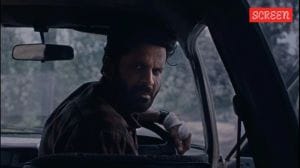One of the year’s most anticipated debuts, Vauhini Vara’s The Immortal King Rao reimagines an apocalyptic future
Caste, technology and climate change play a crucial role in the narrative, which falters because it tries to bite more than it can chew.
 The Immortal King Rao by Vauhini Vara. (Source: Amazon)
The Immortal King Rao by Vauhini Vara. (Source: Amazon)Vauhini Vara’s debut novel The Immortal King Rao could have easily been episodes from the dystopian British television series Black Mirror, or a storyline from Margaret Atwood’s Gilead dominated world. It could also be a leaflet from Raja Rao’s Kanthapura (1938). But King Rao is all of this and more. In King Rao, one of this year’s highly anticipated literary releases, Vara uses three premises and timelines to string together a series of visions that are both fantastic and prophetic. On the one hand, it builds on the Dalit pride of being landowning-Raos, and, on the other, is a layered narrative about techno-capitalism and its repercussions. All of this is overshadowed by the premise of climate change and global warming.
Buy Now | Our best subscription plan now has a special price
King Rao alternates between a ’50s Andhra Pradesh village and an AI-led, computerised, America of the future. When King Rao is born, he kills his mother on the way out. However, despite the many confusions he creates within the large Dalit family living in Kothapalli, he also represents changing times. The ambitions pinned to him are revealed the moment he is named King Rao, because he is neither a King nor a Rao. The Raos, who have taken on the surname despite being Burras to gather socio-economic and cultural capital, are not a poor clan. In fact, they take offence at being called poor. Sita, who brings up Rao, says, “We may be Dalits but we are not poor”.
Once Rao leaves for the US to channel his brilliant mind as a computer programmer overseeing a digital revolution, making Coconut (an almost direct analogy of Apple), the novel begins to forewarn his downfall.
The narrator of the novel is Rao’s daughter, Athena, currently lodged in a detention centre on a murder charge. Athena both narrates and addresses the novel. She uses the characters’ names in tandem with the time and the perspective she is referring to. She mediates between the reader and the characters, and, at the same time, represents the outcome of a catastrophe in her own being. Athena’s life, especially her childhood, is in contrast to her father’s. She is shielded from the world, living on a secluded island with no contact with humans until she is 17. As teens, both Athena and Rao, her father, have epiphanies: That “a Rao can just get up and leave”. Rao’s epiphany occurs when his cousin Gun leaves, rather escapes, the large family to live on his own and Athena’s comes through the struggles of an isolated American teen, who has only seen the world through the Internet, with her father.
The present time is ordered by the Algorithm or Algo, a system of Rao’s own making that is eerily similar to how we use technology, or vice versa, in the 21st century. The digital is no longer a thing in isolation, rather, it is an extension of one’s own body. It dictates the characters of the future with an Atwoodian kind of order. In fact, Athena herself awaits a judgement from the Algo, supposedly made to not falter when it comes to justice unlike passionate humans, on the murder charge. The Algo falters precisely because it is made by passionate humans.
Vara builds on the first-world struggle for what is understood as social capital — culture, wealth and technical supremacy. Vara’s symbolisms and how she describes certain concepts, however, is euphemistic: Shareholder for citizen, the Harmonica, and the Clarinet for things related to the Internet, et al. Vara is also acutely aware of the diasporic turns her novel might take and she spends time trying to break down the nuances of both timelines for her audience: Indian and American, Dalit and upper-caste, tyrannical and free, tech-savvy and traditional. To her credit, she does not romanticise the disparities she tries to show, though she is poetic in her descriptions.
King Rao is potent enough to pull the reader into a spiral of prophecies one may have imagined as a 21st century individual. But just when one invests in one timeline, Vara severs the ties, taking us back and forth into another dizzying timeline. Her approach is likely not to isolate the reader but to shock them and she uses her experience as a tech-reporter to harness the complexities of the digital, especially in its interactions with humans. Characters like Athena and Elemen border on being cyborgs despite their corporeality.
The novel is ambitious and complicated to say the least, because it has intertwined caste, class and social struggle with issues such as climate change and an Algo-ridden future. While the scenes set in India are described in exquisite detail, even using the Dalit premise to subvert caste, Vara gets caught up in the dystopian premise which leaves the reader confused. As many readers may have felt, the novel’s shortcoming lies in trying to bite more than it can chew.
📣 For more lifestyle news, follow us on Instagram | Twitter | Facebook and don’t miss out on the latest updates!
Photos





- 01
- 02
- 03
- 04
- 05


























